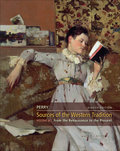
With a collection of over 350 sources, each accompanied by an introductory essay and review questions, this two-volume primary source reader emphasizes theintellectual history and values of the Western tradition. Sources are groupedaround important themes in European history--such as religion, education, andart and culture--so that readers can analyze and compare multiple documents. The Eighth Edition features additional sources by and about women, completely revised chapters on modern Europe and its place in the contemporary world, andupdates to introductions and review questions. INDICE: Part I: EARLY MODERN EUROPE. 1. The Rise of Modernity. 1. The Humanists' Fascination with Antiquity: Petrarch, The Father of Humanism; Leonardo Bruni, Study of Greek Literature and A Humanist Educational Program. 2. Human Dignity: Pico della Mirandola, Oration on the Dignity of Man. 3. Break with Medieval Political Theory: Niccolò Machiavelli, The Prince. 4. The LutheranReformation: Martin Luther, On Papal Power, Justification by Faith, the Interpretation of the Bible, and The Nature of the Clergy. 5. Justification of Absolute Monarchy by Divine Right: Bishop Jacques-Benigne Bossuet, Politics Drawn from the Very Words of Holy Scripture. 6. A Secular Defense of Absolutism: Thomas Hobbes, Leviathan. 7. The Triumph of Constitutional Monarchy in England: The Glorious Revolution: The English Declaration of Rights. 2. The Scientific Revolution. 1. The Copernican Revolution: Nicolaus Copernicus, On the Revolutions of the Heavenly Spheres; Cardinal Bellarmine, Attack on the Copernican Theory. 2. Galileo: Confirming the Copernican System: Galileo Galilei, Letter to the Grand Duchess Christina and Dialogue Concerning the Two Chief World Systems--Ptolemaic and Copernican; Galileo Before the Inquisition. 3. Prophet of Modern Science: Francis Bacon, Attack on Authority and Advocacy of Experimental Science. 4. The Circulation of the Blood: Validating the Empirical Method: William Harvey, The Motion of the Heart and Blood in Animals. 5. The Autonomy of the Mind: René Descartes, Discourse on Method. 6. The Mechanical Universe: IsaacNewton, Principia Mathematica. 3. The Enlightenment. 1. The Enlightenment Outlook: Immanuel Kant, What is Enlightenment? 2. Political Liberty: John Locke, Second Treatise on Government; Thomas Jefferson, Declaration of Independence. 3. Attack on Religion: Voltaire, A Plea for Tolerance and Reason; Thomas Paine, The Age of Reason; Baron d'Holbach, Good Sense. 4. Epistemology: John Locke,Essay Concerning Human Understanding; Claude Helvétius, Essays on the Mind and A Treatise on Man. 5. Compendium of Knowledge: Denis Diderot, Encyclopedia. 6. Rousseau: Political Reform: Jean Jacques Rousseau, The Social Contract. 7. Humanitarianism: Caesare Beccaria, On Crimes and Punishments; John Howard, Prisons in England and Wales; Denis Diderot, Encyclopedia "Men and Their Liberty are Not Objects of Commerce..."; Marquis de Condorcet, The Evils of Slavery. 8. Literature as Satire: Critiques of European Society: Voltaire, Candide; Denis Diderot, Supplement to the Voyage of Bougainville; Montesquieu, The Persian Letters. 9. On the Progress of Humanity: Marquis de Condorcet, Progress of theHuman Mind. Part II: MODERN EUROPE. 4. Era of the French Revolution. 1. Abuses of the Old Regime: Grievances of the Third Estate; Emmanuel Sieyès, What is the Third Estate? 2. The Role of the Philosophes: Alexis de Tocqueville, Critique of the Old Regime. 3. Liberty, Equality, Fraternity: Declaration of the Rights of Man and of Citizens. 4. Expansion of Human Rights: Mary Wollstonecraft, Vindication of the Rights of Women; Society of the Friends of Blacks, Address to the National Assembly in Favor of the Abolition of the Slave Trade; Petition of the Jews of Paris, Alsace, and Lorraine to the National Assembly, January 28, 1790. 5. The Jacobin Regime: Maximilien Robespierre, Republic of Virtue; General Louis de Ligniéres Turreau, Uprising in the Vendée. 6. Demands for Economic Justice: Gracchus Babeuf, Conspiracy of the Equals. 7. Napoleon: Destroyer and Preserver of the Revolution: Napoleon Bonaparte, Leader, General, Tyrant, Reformer. 5. The Industrial Revolution. 1. Early Industrialization: Edward Baines, Britain's Industrial Advantages and the Factory System; Adam Smith, The Division of Labor. 2. The New Science of Political Economy: Adam Smith, The Wealth of Nations; Thomas R. Malthus, On the Principle of Population. 3. TheDark Side of Industrialization: Sadler Commission, Report on Child Labor; James Phillips Kay, Moral and Physical Dissipation; Friedrich Engels, The Condition of the Working Class in England. 4. Factory Discipline; Factory Rules. 5. The Capitalist Ethic: Samuel Smiles, Self-Help and Thrift. 6. Reformers: RobertOwen, A New View of Society. 6. Romanticism, Reaction, Revolution. 1. Romanticism: William Wordsworth, Tables Turned; William Blake, Milton; Johann Wolfgang von Goethe, Faust. 2. Conservatism: Edmund Burke, Reflections on the Revolution in France; Klemens von Metternich, The Odious Ideas of the Philosophes; Joseph de Maistre, Essay on the Generative Principle of Political Constitutions.3. Liberalism: John Stuart Mill, On Liberty. 4. Rise of Modern Nationalism: Ernst Moritz Arndt, The War of Liberation; Giuseppe Mazzini, Young Italy. 5. Repression: Karlsbad Decrees. 6. 1848: The Year of Revolutions; Flora Tristan, "Workers, Your Condition...Is Miserable and Distressing"; Alexis de Tocqueville, The June Days. 7. Thought and Culture in an Age of Science and Industry. 1. Realism in Literature: Vissarion Belinsky, The Poetry of Reality; Henrik Ibsen, A Doll's House. 2 Theory of Evolution: Charles Darwin, Natural Selection. 3.The Socialist Revolution: Karl Marx and Friedrich Engels, Communist Manifesto. 4. The Evolution of Liberalism: L. T. Hobhouse, Justification for State Intervention; Herbert Spencer, The Man Versus the State. 8. Politics and Society, 1845 -1914. 1. The Lower Classes: Nikolaus Osterroth, The Yearning for Social Justice; William Booth, In Darkest England; Henry Mayhew, Prostitution in Victorian London. 2. Feminism and Antifeminism: John Stuart Mill, The Subjection of Women; Emmeline Pankhurst, Why We Are Militant; The Goncourt Brothers, On Female Inferiority; Almroth E. Wright, The Unexpurgated Case Against Woman Suffrage. 3. German Racial Nationalism; Houston Stewart Chamberlain, The Importanceof Race; Pan-German League, "There Are Dominant Races and
- ISBN: 978-0-495-91321-4
- Editorial: Wadsworth
- Encuadernacion: Rústica
- Páginas: 560
- Fecha Publicación: 31/01/2011
- Nº Volúmenes: 1
- Idioma: Inglés
